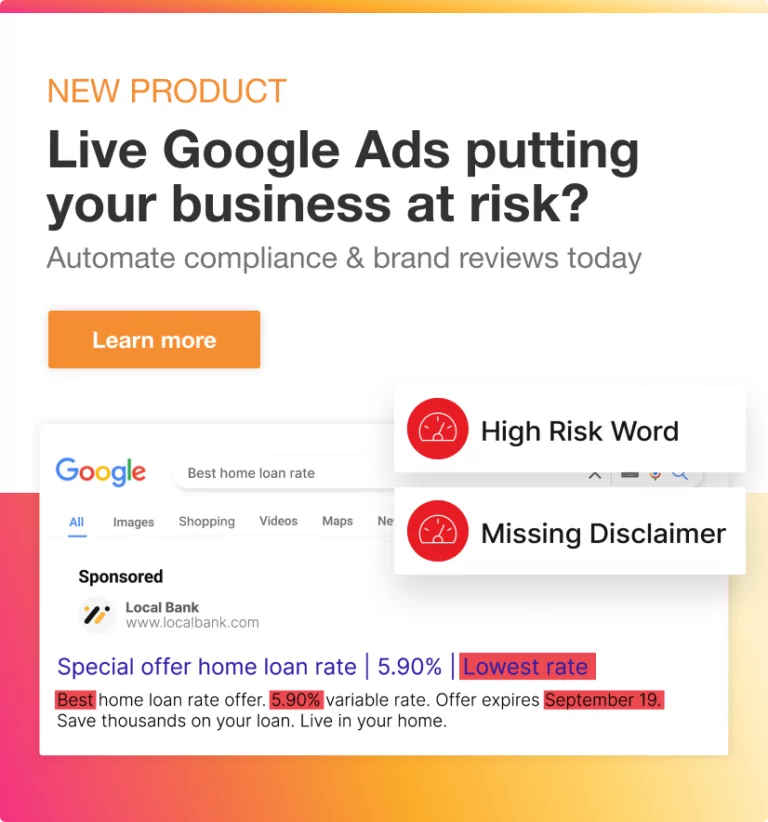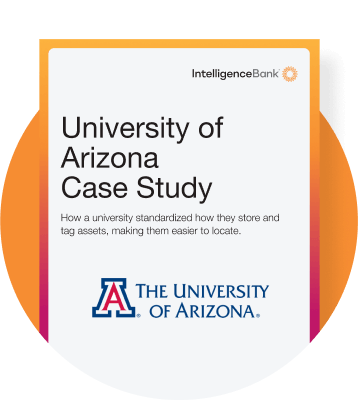For financial institutions in the US, precise implementation of FINRA Rule 2210 is critical to avoiding penalties, maintaining trust, and protecting their reputation. But the cold reality is that understanding, interpreting and upholding these rules across hundreds of campaigns can be overwhelming.
In this guide, we break down what FINRA Rule 2210 is, the penalties for non-compliance, and how AI and automation can assist the review and approval process.
Disclaimer: This document is not intended as a substitute for legal advice. This report has been prepared using both public and private data by IntelligenceBank, a provider of software that helps companies stay on brand and adhere to regulatory compliance. Companies should seek professional legal and regulatory advice when establishing internal compliance protocols.
What are the Key UK Retail Banking Marketing Compliance Rules?
The Financial Conduct Authority (FCA) enforces strict regulations to ensure that banks and financial institutions provide clear, fair, and transparent information to consumers, particularly when marketing credit and mortgage products. These marketing compliance rules were created to protect consumers from misleading or harmful financial promotions.
Key regulations and directives that fall under the FCA include:
- Banking: Conduct of Business Sourcebook (BCOBS): Applies to retail banking products and services, such as current accounts, savings accounts, and loans. It sets out rules for communications, including the need for clarity, fairness, and accuracy.
- Conduct of Business Sourcebook (COBS): Covers investment products and services, including stocks, bonds, and insurance-based investments. COBS requires firms to ensure that financial promotions are fair, clear, and not misleading, and that they include appropriate risk warnings.
- Market Abuse Regulation (MAR): Prohibits insider dealing, market manipulation, and the unlawful disclosure of inside information. While MAR primarily applies to trading activities, it also has implications for marketing communications, particularly those related to investment products.
- FCA Financial Promotions Rules: These rules apply to all forms of marketing, including digital ads, social media, emails, and printed materials, and require that all communications are balanced, accurate, and compliant.
The FCA’s rules apply to three main types of communications:
- Retail Communications: Materials aimed at individual consumers, such as ads, brochures, and website content.
- Professional Communications: Materials targeting professional clients, such as institutional investors.
- Real-Time Communications: Direct interactions with customers, such as phone calls or face-to-face meetings.
Firms must ensure that all marketing materials are approved by a compliance officer, maintain records of all communications, and substantiate any claims made in their promotions.
What Are the Penalties for Non-Compliance with UK Banking Rules?
Non-compliance with FCA regulations can have dire consequences for financial institutions. Any misleading or inaccurate communications can harm consumers and undermine trust in the entire financial sector, so any violations are treated extremely seriously by the FCA.
Potential penalties include:
- Regulatory Fines: Firms can face significant fines for breaching FCA rules. For example, in recent years, several firms have been fined millions of pounds for failing to ensure their financial promotions were clear, fair, and not misleading. For example, in 2020 Lloyds Banking Group were fined £64 million for their treatment of distressed mortgage holders. The fine was in part due to misleading communications with customers in mortgage arrears, including unfair and unclear information about fees and charges. (FCA)
Individuals can also be personally penalized. If the FCA finds that an individual has failed to meet their responsibilities, it can take enforcement action against them, including fines, bans and public censure. - Reputational Damage: Publicized violations can damage a firm’s reputation, leading to a loss of customers and business opportunities.
- Increased Scrutiny: Firms that violate FCA rules may face more frequent audits and inspections, which can be time-consuming and costly.
- Class Action: In severe cases, non-compliance can lead to lawsuits from large groups of consumers who feel they were misinformed and harmed.
Marketing compliance is serious business, and most marketers want to do the right thing. Quite often, compliance slip ups can simply be a result of poor risk management. Even so, the penalties on the table underline the importance of ensuring that marketing materials are compliant with FCA regulations. But with so many rules to follow, how can firms manage compliance effectively?
Challenges of Upholding UK Retail Banking Marketing Compliance Rules
FCA rules are complex and subject to frequent updates. Keeping up with these changes and ensuring consistent interpretation across all materials can be challenging. Here’s why:
Growing Volume of Marketing Content
The Advertising Association and WARC’s expenditure report shows UK ad spend to have grown 11.2% during 2024. (WARC) This spike in spend means firms are producing more content than ever before. From social media posts and email campaigns to website content and printed materials, the volume of materials that need to be reviewed for compliance has shot up. Add to this the growing use of generative AI tools, which can produce content at scale, and the workload for compliance teams becomes intense.
Shorter Production Deadlines
Retail bank marketing teams are often under pressure to produce and publish content quickly. Tight deadlines can lead to rushed compliance reviews, increasing the risk of errors.
Limited Compliance Resources
Many firms operate with lean compliance teams, making it difficult to keep up with the demands of reviewing and approving every piece of marketing material. This can result in compliance becoming a bottleneck, slowing down campaigns and frustrating marketing teams.
Complex and Evolving Regulations
FCA rules are complex and subject to frequent updates. Keeping up with these changes and ensuring consistent interpretation across all materials can be challenging.
Repetitive and Time-Consuming Reviews
Compliance reviews often involve repetitive tasks, such as checking for balanced presentations, verifying data, and ensuring proper disclosures. These tasks can be tedious and time-consuming for compliance teams.
Can UK Retail Banking Marketing Compliance Be Automated?
Fortunately, yes. Not only can it be automated, but can provide better speed and accuracy outcomes than manual efforts.
Automating compliance saves time, reduces the risk of human error, and ensures consistent interpretation of the rules. The IntelligenceBank compliance automation platform uses AI to review marketing content against a comprehensive list of FCA requirements, flagging potential issues before they spell trouble.
Here’s how it works:
- Create Risk Rules: IntelligenceBank offers a range of pre-existing rules tailored to specific legislation and regulations by industry and location, including UK Retail Banking. These rules can be customized or expanded to fit your organization’s compliance needs.
- Automatically Review Content: Marketing content is automatically reviewed. The platform uses AI-powered technology to see if any of these rules have been breached in your content, (e.g. collateral, digital ads, social media etc.). Reviews can be done at any stage in the production cycle – even when content is already live. The platform provides you with feedback and suggestions for improvement.
- Keep a Record: The platform automatically maintains records of all comments made on PDFs, artwork and images etc. so they can easily be referred to down the line.
Benefits of Automating UK Retail Banking Compliance Reviews
Automating compliance reviews helps UK retail banks meet complex FCA regulations while streamlining marketing approval processes. AI-powered tools quickly review materials for potential issues, flagging non-compliant language. While human oversight remains essential for nuanced cases, AI efficiently handles black-and-white regulatory rules.
Data from IntelligenceBank clients shows that over 75% of comments on marketing content made by Legal or Compliance teams relates to errors such as incorrect claims, and missing or incorrect disclaimers. They are the type of comments that AI can deal with on the spot.
Anonymous amalgamated data from IntelligenceBank clients shows that over 75% of comments on marketing content made by Legal or Compliance teams relates to errors such as incorrect claims, and missing or incorrect disclaimers. They are the type of comments that AI can deal with on the spot. Here is a snapshot of of the results:
- 17% of comments relate to brand compliance issues: These focused on things like brand name usage, logo issues, font sizes, tone, and readability.
- 38% of comments relate to legal and compliance issues: Common concerns included outdated disclaimers, inaccurate claims, missing disclosures, and specific legal language requests.
- 22% of comments are about wording: This includes phrasing issues around claims and product disclosures, rather than basic spelling and grammar.
- 23% of comments required direct human intervention, where nuance or specific context was needed.
Automating compliance reviews can save a significant amount of time. Predicted savings can be estimated via the Content and Web Risk Reviews Cost Savings Calculator.
Beyond speed, AI-powered compliance tools enhance consistency by applying standardized checks across all content. This reduces human bias and interpretation discrepancies, ensuring a uniform approach to compliance. Plus, with the ability to review high volumes of content, firms can scale marketing efforts without compliance becoming a bottleneck.
Firms leveraging AI-driven compliance solutions report significant reductions in manual review time and a faster go-to-market process. By automating compliance checks, marketing teams can create content more efficiently while maintaining strict FCA adherence.
Why Industry-Specific Compliance Solutions Work
A marketing compliance platform designed for specific industry or regional regulations knows exactly what to look for. This targeted approach not only improves accuracy but also reduces system setup and deployment time from weeks to days.
When operating in a clearly defined industry such as banking, it makes sense to start with a package that has been tailored to the corresponding legislation.
Beyond being purpose-built to meet FCA requirements, industry-specific rule platforms help compliance teams stay ahead of regulatory changes. As retail bank marketers know, FCA rules and expectations are constantly evolving and scrutiny is on the increase. Industry specific rule libraries are continuously updated, ensuring teams have access to the latest compliance requirements and can adapt quickly to new regulations.
Simplified FCA Marketing Compliance Checklist
To give you an idea of what’s included in the IntelligenceBank UK Retail Banking compliance package, we’ve condensed some of the core requirements into a simplified checklist. While this list isn’t an exhaustive, it covers some of the most important points:
1. Include Required Disclosures:
- Ensure all necessary disclosures are prominently displayed and written in transparent, clear language.
- Clarify all fees and ensure disclaimers about potential costs are included.
- Avoid vague references to fees as “minimal”.
2. Avoid Misleading Claims:
- Ensure all claims are accurate, fair, and clear and highlight key fees.
- Put guardrails around absolute claims or describing a feature of a product or service as “guaranteed”, “protected” or “secure”.
3. Verify Data:
- Double-check any performance data or statistics included in your materials.
- Include a notation about the limitations of past performance.
4. Relationship Transparency:
- Disclose the nature of your firm’s relationship with individuals used in communication.
5. Maintain Records:
- Ensure your recommendations are supported by adequate information and disclose any conflicts of interest.
Get the complete list with IntelligenceBank industry-specific risk reviews.
Regulators Use AI to Track Compliance
While financial marketers are increasingly turning to AI-powered tools to ensure compliance they’re not alone in leveraging this transformative technology. Regulatory bodies themselves are adopting AI to enhance their oversight capabilities, detect compliance breaches, and enforce rules more effectively. The FCA’s Market Watch program uses AI to scan for wrongdoing to ensure fair trading practices.
This shift highlights the growing importance of AI in the compliance landscape and underscores why businesses should embrace automation to stay ahead of regulatory scrutiny.
Want a Complete Checklist? Let’s Talk
While the checklist above gives you an overview, the IntelligenceBank industry-ready UK Retail Banking Compliance package offers a comprehensive cache of granular rules to help you meet every standard mandated by the FCA. And because every firm has their own additional rules and appetite for risk, rule packages are not set in concrete and can be tailored to fit your firm’s specific needs.
Staying compliant helps you stay competitive. Automating content reviews against clear FCA guidelines ensures firms don’t just meet regulations efficiently—they gain the edge by getting to market faster. Let’s show you how.
Get in touch.




